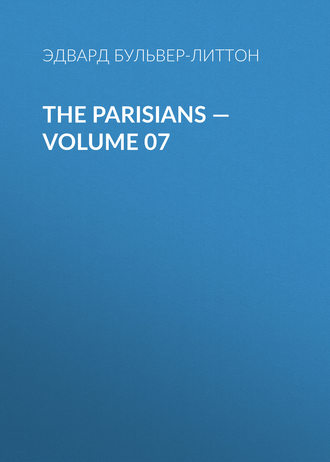
Эдвард Бульвер-Литтон
The Parisians — Volume 07
"Now you have my most secret thoughts. I intrust them to your judgment with entire confidence. Monsieur Lebeau gave you a high character, which you have hitherto deserved. By the way, have you seen anything lately of that bourgeois conspirator?"
"No, his professed business of letter-writer or agent is transferred to a clerk, who says M. Lebeau is abroad."
"Ah! I don't think that is true. I fancy I saw him the other evening gilding along the lanes of Belleville. He is too confirmed a conspirator to be long out of Paris; no place like Paris for seething brains."
"Have you known M. Lebeau long?" asked Rameau. "Ay, many years. We are both Norman by birth, as you may perceive by something broad in our accent."
"Ha! I knew your voice was familiar to me; certainly it does remind me of Lebeau's."
"Normans are like each other in many things besides voice and accent— obstinacy, for instance, in clinging to ideas once formed; this makes them good friends and steadfast enemies. I would advise no man to make an enemy of Lebeau.
"Au revoir, cher confrere. Do not forget to present me to Mademoiselle Cicogna."
CHAPTER II
On leaving De Mauleon and regaining his coupe, Rameau felt at once bewildered and humbled, for he was not prepared for the tone of careless superiority which the Vicomte assumed over him. He had expected to be much complimented, and he comprehended vaguely that he had been somewhat snubbed. He was not only irritated—he was bewildered; for De Mauleon's political disquisitions did not leave any clear or definite idea on his mind as to the principles which as editor of the Sens Commun he was to see adequately represented and carried out. In truth, Rameau was one of those numerous Parisian politicians who have read little and reflected less on the government of men and States. Envy is said by a great French writer to be the vice of Democracies. Envy certainly had made Rameau a democrat. He could talk and write glibly enough upon the themes of equality and fraternity, and was so far an ultra-democrat that he thought moderation the sign of a mediocre understanding.
De Mauleon's talk, therefore, terribly perplexed him. It was unlike anything he had heard before. Its revolutionary professions, accompanied with so much scorn for the multitude, and the things the multitude desired, were Greek to him. He was not shocked by the cynicism which placed wisdom in using the passions of mankind as tools for the interests of an individual; but he did not understand the frankness of its avowal.
Nevertheless the man had dominated over and subdued him. He recognized the power of his contributor without clearly analysing its nature— a power made up of large experience of life, of cold examination of doctrines that heated others—of patrician calm—of intellectual sneer— of collected confidence in self.
Besides, Rameau felt, with a nervous misgiving, that in this man, who so boldly proclaimed his contempt for the instruments he used, he had found a master. De Mauleon, then, was sole proprietor of the journal from which Rameau drew his resources; might at any time dismiss him; might at any time involve the journal in penalties which, even if Rameau could escape in his official capacity as editor, still might stop the Sens Commun, and with it Rameau's luxurious subsistence.
Altogether the visit to De Mauleon had been anything but a pleasant one. He sought, as the carriage rolled on, to turn his thoughts to more agreeable subjects, and the image of Isaura rose before him. To do him justice he had learned to love this girl as well as his nature would permit: he loved her with the whole strength of his imagination, and though his heart was somewhat cold, his imagination was very ardent. He loved her also with the whole strength of his vanity, and vanity was even a more preponderant organ of his system than imagination. To carry off as his prize one who had already achieved celebrity, whose beauty and fascination of manner were yet more acknowledged than her genius, would certainly be a glorious triumph.
Every Parisian of Rameau's stamp looks forward in marriage to a brilliant salon. What salon more brilliant than that which he and Isaura united could command? He had long conquered his early impulse of envy at Isaura's success,—in fact that success had become associated with his own, and had contributed greatly to his enrichment. So that to other motives of love he might add the prudential one of interest. Rameau well knew that his own vein of composition, however lauded by the cliques, and however unrivalled in his own eyes, was not one that brings much profit in the market. He compared himself to those poets who are too far in advance of their time to be quite as sure of bread and cheese as they are of immortal fame.
But he regarded Isaura's genius as of a lower order, and a thing in itself very marketable. Marry her, and the bread and cheese were so certain that he might elaborate as slowly as he pleased the verses destined to immortal fame. Then he should be independent of inferior creatures like Victor de Mauleon. But while Rameau convinced himself that he was passionately in love with Isaura, he could not satisfy himself that she was in love with him.
Though during the past year they had seen each other constantly, and their literary occupations had produced many sympathies between them— though he had intimated that many of his most eloquent love-poems were inspired by her—though he had asserted in prose, very pretty prose too, that she was all that youthful poets dream of,—yet she had hitherto treated such declarations with a playful laugh, accepting them as elegant compliments inspired by Parisian gallantry; and he felt an angry and sore foreboding that if he were to insist too seriously on the earnestness of their import and ask her plainly to be his wife, her refusal would be certain, and his visits to her house might be interdicted.
Still Isaura was unmarried, still she had refused offers of marriage from men higher placed than himself,—still he divined no one whom she could prefer. And as he now leaned back in his coupe he muttered to himself, "Oh, if I could but get rid of that little demon Julie, I would devote myself so completely to winning Isaura's heart that I must succeed!—but how to get rid of Julie? She so adores me, and is so headstrong! She is capable of going to Isaura—showing my letters—making such a scene!"
Here he checked the carriage at a cafe on the Boulevard—descended, imbibed two glasses of absinthe,—and then feeling much emboldened, remounted his coupe and directed the driver to Isaura's apartment.
CHAPTER III
Yes, celebrities are of rapid growth in the salons of Paris. Far more solid than that of Rameau, far more brilliant than that of De Mauleon, was the celebrity which Isaura had now acquired. She had been unable to retain the pretty suburban villa at A———. The owner wanted to alter and enlarge it for his own residence, and she had been persuaded by Signora Venosta, who was always sighing for fresh salons to conquer, to remove (towards the close of the previous year) to apartments in the centre of the Parisian beau monde. Without formally professing to receive, on one evening in the week her salon was open to those who had eagerly sought her acquaintance—comprising many stars in the world of fashion, as well as those in the world of art and letters. And as she had now wholly abandoned the idea of the profession for which her voice had been cultivated, she no longer shrank from the exercise of her surpassing gift of song for the delight of private friends. Her physician had withdrawn the interdict on such exercise. His skill, aided by the rich vitality of her constitution, had triumphed over all tendencies to the malady for which he had been consulted. To hear Isaura Cicogna sing in her own house was a privilege sought and prized by many who never read a word of her literary compositions. A good critic of a book is rare; but good judges of a voice are numberless. Adding this attraction of song to her youth, her beauty, her frank powers of converse—an innocent sweetness of manner free from all conventional affectation—and to the fresh novelty of a genius which inspired the young with enthusiast and beguiled the old to indulgence, it was no wonder that Isaura became a celebrity at Paris.
Perhaps it was a wonder that her head was not turned by the adulation that surrounded her. But I believe, be it said with diffidence, that a woman of mind so superior that the mind never pretends to efface the heart, is less intoxicated with flattery than a man equally exposed to it.
It is the strength of her heart that keeps her head sober. Isaura had never yet overcome her first romance of love; as yet, amid all her triumphs, there was not a day in which her thoughts did not wistfully, mournfully, fly back to those blessed moments in which she felt her cheek colour before a look, her heart beat at the sound of a footfall. Perhaps if there had been the customary finis to this young romance—the lover's deliberate renunciation, his formal farewell—the girl's pride would ere this have conquered her affection,—possibly—who knows?— replaced it.
But, reader, be you male or female, have you ever known this sore trial of affection and pride, that from some cause or other, to you mysterious, the dear intercourse to which you had accustomed the secret life of your life, abruptly ceases; you know that a something has come between you and the beloved which you cannot distinguish, cannot measure, cannot guess, and therefore cannot surmount; and you say to yourself at the dead of solitary night, "Oh for an explanation! Oh for one meeting more! All might be so easily set right; or if not, I should know the worst, and knowing it, could conquer!"
This trial was Isaura's. There had been no explanation, no last farewell between her and Graham. She divined—no woman lightly makes a mistake there—that he loved her! She knew that this dread something had intervened between her and him when he took leave of her before others so many months ago; that this dread something still continued—what was it? She was certain that it would vanish, could they but once meet again and not before others. Oh for such a meeting!
She could not herself destroy hope. She could not marry another. She would have no heart to give to another while he was free, while in doubt if his heart was still her own. And thus her pride did not help her to conquer her affection.
Of Graham Vane she heard occasionally. He had ceased to correspond with Savarin; but among those who most frequented her salon were the Morleys. Americans so well educated and so well placed as the Morleys knew something about every Englishman of the social station of Graham Vane. Isaura learned from them that Graham, after a tour on the Continent, had returned to England at the commencement of the year, had been invited to stand for Parliament, had refused, that his name was in the list published by the Morning Post of the elite whose arrivals in London, or whose presence at dinner-tables, is recorded as an event. That the Athenaeum had mentioned a rumour that Graham Vane was the author of a political pamphlet which, published anonymously, had made no inconsiderable sensation. Isaura sent to England for that pamphlet: the subject was somewhat dry, and the style, though clear and vigorous, was scarcely of the eloquence which wins the admiration of women; and yet she learned every word of it by heart.
We know how little she dreamed that the celebrity which she hailed as an approach to him was daily making her more remote. The sweet labours she undertook for that celebrity continued to be sweetened yet more by secret associations with the absent one. How many of the passages most admired could never have been written had he been never known!
And she blessed those labours the more that they upheld her from the absolute feebleness of sickened reverie, beguiled her from the gnawing torture of unsatisfied conjecture. She did comply with Madame de Grantmesnil's command—did pass from the dusty beaten road of life into green fields and along flowery river-banks, and did enjoy that ideal by- world.
But still the one image which reigned over her human heart moved beside her in the gardens of fairyland.







